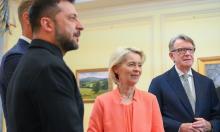US State Department Finds New Sponsors
Several days ago, the U.S. State Department issued a report on international terrorism. It covers the activities of organizations like al-Qaeda and countries that support terrorists.

The report names Al-Qaeda the main danger for the United States. The State Department noted that the group continues to attack Americans and threaten American interests around the world. It tries to recruit as many militants as it can, including the natives of Western Europe and North America.
After describing the troubles caused to the U.S. and the entire world by Osama bin Laden, the State Department moved to individual countries sponsoring terrorism. At this time, they were four of them - Iran, Syria, Sudan and Cuba.
Russia Today: Islamophobia growing in America
Iran was traditionally called the most active sponsor of terrorism. According to the Americans, the Islamic Republic supports the most notorious and radical elements in Lebanon, Palestine, Iraq and Afghanistan. Iran may be associated with Hamas controlling Gaza and Lebanese Hezbollah (which, incidentally, are not considered terrorist organizations by all countries).
A large section of the report is devoted to Syria. “Syrian officials publicly condemned international terrorism but continue to insist that there is a distinction between terrorist acts and attacks by the ”national liberation movements” engaged in a legitimate armed resistance, including the Palestinian groups, the Lebanese Hezbollah and the Iraqi opposition members,” complained the report's authors. The report mentions that, in contrast to the Syrians, the U.S. considers radicals like HAMAS terrorists, and not freedom fighters.
The assessment of Sudan’s actions, whose president Omar al-Bashir is wanted at the request of the Hague Tribunal, is rather reserved. U.S. mentions that the authorities are fighting with militants threatening American citizens and interests of States in this country. The State Department does not like the presence of hardliners in the Sudanese leadership, as well as numerous rebel groups like the Lord's Resistance Army in the south of the country. Note that previously Sudan was considered nearly the main supporter of al-Qaeda.
The fact that the Castro brothers condemn international terrorism was deemed positive. However, the Americans believe that the Cubans support radical leftist groups in Colombia (including the Revolutionary Armed Forces of Colombia; FARC), as well as the Basque terrorists from ETA group in Spain and France. The United States also do not like the fact that Cuba provided shelter to some radical “fugitives from the United States.”
So far, Cuba is the only country to have responded to the report of the State Department. “We categorically oppose […] the decision of the State Department ... to include Cuba in the list of the countries supporting international terrorism, and demand that our country is immediately taken off this list,” said the country’s Foreign Minister in his statement.
In addition, Cubans accused the Americans of double standards policy. Thus, Cuban officials complained that the U.S. was hiding Luis Posada Carriles, an active opponent of the Castro brothers accused by a number of Latin American countries in terrorist activities. Cuba and Venezuela insist on his extradition, but the Americans refuse to extradite him.
It is worth mentioning that this list of international sponsors of terrorism does not include “traditional” participants, for example, Libya and North Korea. The Americans wrote that since 1987, when an explosion occurred at Korean Airlaines company liner, there has been no evidence of Pyongyang's support of terrorist activities.
But has the leadership of these countries refused to support various kinds of “guerrilla” movements around the world, often referred to as terrorist? For example, it is difficult to find at least one conflict on the African continent which would not involve Libyan secret service. In turn, the North Korean side also has no intentions of minimizing collaboration with various rebel groups. In the past, it was North Korean commandos who prevented militants of the well known mercenary Bob Dinara from overthrowing the regime in Benin that was disagreeable with the French. Moreover, Pyongyang was repeatedly accused of collaboration with Burma, Iran and Syria on nuclear missile technology.
“North Korea's behavior is difficult to qualify as international terrorism,” Alexander Khramchikhin, Deputy Director of the Institute of Political and Military Analysis, told Pravda.ru. “Several U.S. congressmen really insist that the DPRK is put back on the list of the main sponsors of international terrorism after the sinking of the South Korean corvette Cheonan. But it was not an act of terrorism, it was a combat operation.
And another thing: no one has given precise definitions of international terrorism yet. Therefore , anyone can be called terrorist .
As for Libya, it is all on the surface here. It scaled down all programs designed to develop weapons of mass destruction, extradited all terrorists accused in the case of Lockerbie, and began cooperation with the West. Now it is implementing mutually beneficial energy projects with Western companies.”
“Libya did not make it to the list because it stopped to affect the interests of America,” said Konstantin Sivkov, first vice-president of the Academy of Geopolitical Issues. “Its old sins were forgiven in exchange for lucrative oil and gas contracts. With the DPRK everything is clear. In 2006 it acquired nuclear weapons. Americans do not want to attack a country with nuclear arsenal.
Why did Cuba, Sudan, Syria and Iran make the list? First, these countries are the centers of anti-American resistance in different regions of the world. Secondly, some of them have large reserves of raw materials, which the U.S. wants to control.
In fact, the State Department list includes the countries which Washington (for the time of Obama presidency) has announced enemies. Various measures of economic and political nature will be taken against these countries. I do not rule out that they may suffer aggression, as it was with Afghanistan and Iraq that had previously appeared on this list".
Sergei Balmasov
Vadim Trukhachev
Pravda.Ru
Subscribe to Pravda.Ru Telegram channel, Facebook, RSS!




